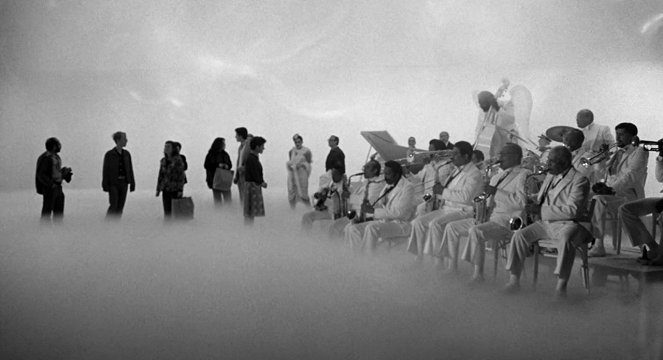Réalisation:
Woody AllenScénario:
Woody AllenPhotographie:
Gordon WillisActeurs·trices:
Woody Allen, Charlotte Rampling, Jessica Harper, Marie-Christine Barrault, Tony Roberts, Daniel Stern, John Rothman, Armin Shimerman (plus)VOD (1)
Résumés(1)
Sandy Bates est un cinéaste admiré et célébré pour ses films à l’humour mordant. Invité à une rétrospective de son œuvre, le réalisateur se retrouve en pleine crise. Son public hystérique l’irrite car il ne le comprend pas. Tiraillé par son œuvre, Sandy souhaite rencontrer le succès avec un nouveau film qui sera sérieux, différent de tous les autres. Quant à sa vie amoureuse, elle lui donne encore plus de tourments. Le prodige du cinéma ne sait qui choisir entre son actrice Dorrie, imprévisible et névrosée, et Isobel, une femme mariée. (LaCinetek)
(plus)Critiques (3)
Stardust Memories is the kind of film where individual scenes work very well, but something is missing from the film as a whole. It lacks something like a story and catharsis. It is an autobiographically inclined film about a director who is going through a creative crisis and dealing with the failure of his last film, which received reserved criticism and reception from both critics and audiences. Allen engages with both groups and fills the screen with eccentric characters who are entertaining in their appearance and dialogues. However, as the minutes pass, and this film does not have a long duration, the image becomes increasingly scattered and the film becomes more neurotic than its creator. Just like Woody Allen, his film alter ego also decides at some point to stop making comedies and focus on more tragic aspects of human life, but comedies simply have an easier time with audiences. A few scenes, such as the one where Allen gets on a train full of gloomy and unattractive people, and notices that on the opposite platform, a train full of seemingly successful people is leaving, and desperately and unsuccessfully tries to get into the other train, remain in the viewer's memory - partly because they capture our life feelings well. But the film doesn't work as a whole. Overall impression: 60%.
()
It doesn't matter where the train goes - let it go to the dump if it wants - as long as you sit in the carriage with someone you like to sit with. A very good film, but it just seemed either too long or too rambling. I don't know exactly. Either way, entertainment once again goes hand in hand with intelligence and sensitive emotions, a time-honored combination.
()
Just as people and their nature often unexpectedly change, so can one's opinion of a film completely flip. Memories had long meant the worst film of my creative idol to me, but when I gave them a second chance, I couldn't believe how everything was suddenly different. Woody shows a small part of his life, the battle with producers. He can say as long as he wants that he didn't write the script as an autobiographical statement, but when I read his account of how the audience, critics, or the studio couldn't understand why such a talented comedian was making films like Interiors, it became clear to me that he put a big part of himself into the film. And when he was in full swing, I can't recall him ever jumping so wildly from life philosophy to ironic remarks and from introspective glances into the depths of relationships to subtle critiques of society. However, he ultimately ends calmly, whether on his own screen as the hero of the film or in the theater as a contemplative loner. Because all comedians are ultimately sentimental. And it takes a proper maturity to reach this stardust.
()
Photos (75)
Photo © United Artists


Annonces